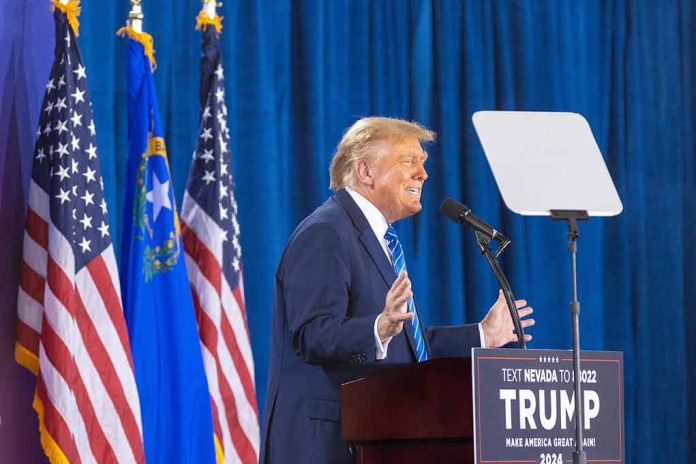
President Trump boldly confronted South African President Cyril Ramaphosa with evidence of genocide against white Afrikaner farmers, cutting all U.S. aid to South Africa and offering refugee status to those fleeing the violence.
Key Takeaways
- President Trump played video evidence in the Oval Office showing a far-left politician chanting “kill the farmer” and presented newspaper articles documenting violence against white South Africans.
- Trump has issued an executive order cutting all U.S. assistance to South Africa and welcomed white South African farmers to America as refugees.
- The South African government under Ramaphosa denies any state-sanctioned violence against white farmers or land seizures based on race.
- Trump accused South Africa of implementing land expropriation policies that disproportionately target white farmers and create conditions for targeted violence.
- Despite the tense exchange, Ramaphosa claimed the meeting was productive for trade and investment discussions while dismissing Trump’s genocide concerns.
Trump Takes Stand for Persecuted White Farmers
During a high-stakes meeting at the White House, President Trump confronted South African President Cyril Ramaphosa with compelling evidence of what he described as genocide against white Afrikaner farmers in South Africa. The meeting, which began cordially, quickly turned tense as Trump insisted on showing videos and newspaper articles documenting violence against white farmers. Trump’s decisive action included an executive order cutting all U.S. funding to South Africa and establishing a program to welcome affected farmers as refugees to America.
“People are fleeing South Africa for their own safety. Their land is being confiscated and in many cases they’re being killed” Said President Donald Trump.
Trump’s presentation included footage of Julius Malema, a controversial South African opposition leader, singing an anti-apartheid song with lyrics calling to “kill the farmer.” Trump also displayed newspaper articles documenting murders of white farmers across South Africa. His concerns centered on land expropriation policies that he believes are part of systematic targeting of the white minority farming community, whose ancestors have farmed the land for generations.
Ramaphosa Denies Government Involvement
President Ramaphosa strongly rejected Trump’s characterization of the situation, insisting there is no government policy targeting white farmers. When Trump directly accused South Africa of taking land from farmers, Ramaphosa responded with a firm denial. However, Trump’s evidence of ongoing violence and reports of farmers fleeing to countries like Australia and the United States painted a different picture of the situation on the ground.
“We are completely opposed to that, that is not government policy and our government policy is completely, completely against what he was saying” Said Cyril Ramaphosa, President of South Africa.
The South African government’s position is that violence affects citizens of all races, not specifically white farmers. Crime statistics presented by Ramaphosa suggest that black South Africans are the primary victims of violence in the country. Nevertheless, agricultural communities have reported targeted attacks that appear to have racial motivations, with brutal farm murders continuing to make headlines within South Africa and internationally.
America’s Humanitarian Response
President Trump’s executive order cutting aid to South Africa represents a significant shift in U.S. foreign policy toward the country. By offering refugee status to white South African farmers, Trump has acknowledged what many conservative organizations have been reporting for years – that a vulnerable minority group faces persecution based on race and historical land ownership. This humanitarian response stands in stark contrast to the previous administration’s approach, which largely ignored the plight of these farmers.
“You take a look at Australia, they’re being inundated and we’re being inundated with people that want to get out” Said President Donald Trump.
Despite the tension during the Oval Office meeting, Ramaphosa attempted to downplay the confrontation afterward, suggesting the two leaders had productive discussions on trade and investment opportunities. However, Trump’s forceful presentation of evidence and subsequent policy actions indicate his administration is taking the reports of targeted violence seriously. The refugee program established by Trump provides a lifeline for farmers who feel threatened by both government land policies and violent attacks.
Economic Implications and Path Forward
The cutting of U.S. aid to South Africa will have significant economic consequences for Ramaphosa’s government, which has been struggling with high unemployment and economic inequality. Trump’s decision signals that American foreign assistance will be contingent on South Africa addressing concerns about minority protections and property rights. While some critics have characterized Trump’s actions as interfering in another nation’s affairs, supporters point to America’s long tradition of advocating for human rights globally.
South Africa remains one of the most unequal societies globally, with economic disparities largely reflecting the racial divisions left by apartheid. However, Trump’s administration has made clear that attempts to address these historical inequalities must not create new forms of racial targeting or property seizures without compensation. The question now remains whether Ramaphosa’s government will modify its land reform approach to address American concerns or continue on its current path without U.S. financial support.




